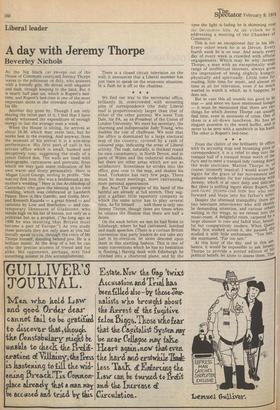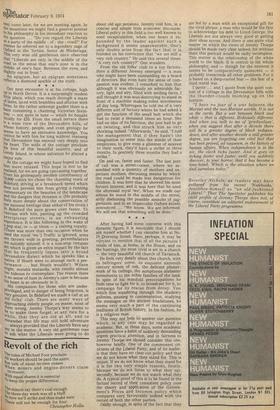A day with Jeremy Thorpe
Beverley Nichols
As the big black car sweeps out of the House of Commons courtyard Jeremy Thorpe waves to the policeman on duty, who answers with a friendly grin. He drives with elegance and dash, though keeping to the limit. But it is nearly half past six, which is Rupert's bedtime, and Rupert's bed-time is one of the most important dates in the crowded calendar of his life.
Another day gone by. Though I am only sharing the latter part of it, I feel that I have already witnessed, the expenditure of enough energy to last the average man a week.
When the House is sitting, he arrives at about 10.30, which may seem late, but he works best in the evening. And anyway, from the moment of his arrival it is a non-stop performance. His first port of call is his private office which is small, hushed and deceptively cosy, suggesting the study of a junior Oxford don. The walls are lined with photographs, caricatures and portraits, from which we may gain some indication of his own warm and lively personality. Here is Megan Lloyd George, smiling in profile. "She was my first love. She was a bridesmaid at my mother's wedding." Here is the Archbishop of Canterbury who gave the blessing at his own wedding, which was celebrated at Lambeth Palace. Here is Mrs Gandhi, and GoIda Meir, and Kenneth Kaunda — a great friend — and cartoons by Low and Beerbohm — and contemporary likenesses of Gladstone, who stands high on his list of heroes, not only as a politician but as a prophet. ("As long ago as 1890 he was insisting that Britain must become a part of Europe.") As you study these portraits they not only stare at you but literally speak to you, through the voice of Mr Thorpe himself, standing behind you. He is a brilliant mimic. At the drop of a hat he can echo the precise accents of friend and foe alike. His opponents, perhaps, may find something sinister in this accomplishment. There is a closed circuit television on the wall; it announces that a Liberal member has just risen to speak on the economic situation. In a flash he is off to the chamber.
We find our way to the secretarial office, brilliantly lit, overcrowded with mounting piles of correspondence (the daily Liberal mail is proportionately larger than that of either of the other parties). We meet Tom Dale, his PA, an ex-President of the Union of London University. We meet his secretary, the charming and indispensable Judy Young, who doubles the role of chaffeuse. We note that the office is dominated by a large electoral map of the country, covered by a rash of coloured pegs, indicating the areas of Liberal activity. The rash, naturally, is thickest round his own constituency, in North Devon, and in parts of Wales and the industrial midlands, but there are other areas which are not so satisfactory. Sometimes he strides into the office, goes over to the map, and shakes his head. Yorkshire has very few pegs. There must be more meetings, more canvassing, more personal appearances.
But how? The energies of his band of the faithful are already at full stretch. They suggest a gallant little repertory company in which the same actor has to play several roles. As for himself. . . well there is only one Jeremy Thorpe, though there are times when he creates the illusion that there are half a dozen.
' On the week before we met he had flown to Edinburgh, where he had canvassed, lunched and made speeches. (There is a curious British convention that party leaders do not take any part in by-elections, let alone descend upon them in this startling fashion. This is one of many conventions which he has no hesitation in flouting.) Having dealt with Edinburgh he climbed into a chartered plane, and by the
time the light is fading he is skimming over the Devonshire hills. At six o'clock he is addressing a meeting of the Chamber of Commerce.
This is not an exceptional day in his life. Every other week he is in Devon. Every fourth week he is on tour. And nearly every day of every week is crowded with official engagements. Which may be why Jeremy Thorpe, a man with an exceptionally wide range of intellectual interests, always gives the impression of being slightly hungrY, physically and spiritually. Little time for reading, little time for music, and almost n° time at all for television, even if he much wanted to watch it which, as it happens, he does not.
But in case this all sounds too good to be true — and since we have mentioned hunger it must be mentioned that there are two things for which Jeremy Thorpe can usuallY find time, even in moments of crisis. One of them is a sit-down luncheon. He has a.n elegant aversion to the word buffet, and Is never to be seen with a sandwich in his hand. The other is Rupert's bed-time.
From the clatter of the brilliantly lit office, with its accusing map and mounting piles of correspondence, it is a relief to step into the tranquil hall of a tranquil house north of the Park and to meet a tranquil lady coming dowIle the wide staircase. Marion Thorpe is, °I course, intensely musical; I would score he,r legato for the grace of her movements an° andante moderato for her relationship with Jeremy, which is at once deep and delicate. But there is nothing legato about Rupert, the pink-faced, pyjama-clad little boy who runs forward and leaps into his father's arMs. Despite the aforesaid tranquillity there are two television interviewers who will shortlY be demanding attention, and various others waiting in the wings, so we retreat into the music-room. A delightful room, carpeted bY large abusson in rose and faded blue, beautlful but comparatively modern. When Quee,r1, Mary first walked across it, she paused, s";', studied it with little enthusiasm. "Too late, she murmured, "Far too late." At this hour of the day, and in this am" bience, it would be impossible to ask JerentY Thorpe to provide a potted edition of hls political beliefs, let alone to assess them..1113_,t
may come later, for we are meeting again. In the meantime we might find a general pointer to his philosophy in his immediate reaction to rnY question ... "Do you regard the Liberals as a party of the middle of the road?" For answer he referred me to a legendary sage of Oxford in the 'forties, Senor de Madariaga. This very wise old gentleman once observed that "Liberals are only in the middle of the road in the sense that one's nose is in the muddle of one's face. Between the eyes, and Slightly out in front." An epigram, but an epigram sometimes reflects a diamond sparkle of the truth.
Our next encounter is at his cottage, high LI.P In North Devon. It is a surprisingly modest little place, which you reach through a maze of lanes, laced with brambles and aflutter With ferns. In the rather unkempt garden there is a barn containing a charming Victorian Steinw, ay — not quite in tune — which he bought iocally for £35. From the small terrace there is a wide view of the Devonshire hills, of Whose history, people, and even geology he seems to have an extensive knowledge. You cannot be with him for long without realising that Devonshire has entered very deeply into hl.s heart. The walls of the cottage proclaim hts love of this beautiful country, and of Lundy Island, in whose salvation he played a Major role.
At the cottage we might have hoped to find
him more relaxed. This hope is not to be realised, for we are going canvassing together. _From his grotesquely swollen constituency of ',000 voters we chose the charming town of Bideford, driving at a breakneck speed which does not prevent him from giving a running commentary on the beauties of the landscape and the dangers that threaten it. (He probably feels more deeply about the conservation of our national heritage than either of his rivals.) In Bideford the pace grows even faster. To canvass with him, panting up the crowded Precipitous streets, is an exhausting experience. It is like following in the wake of a Pop star, or — at times — a visiting royalty. (There was more than one occasion when he used the royal 'we.') Traffic is ignored, arms are thrown wide in greeting, perambulators are suitably saluted; it is a non-stop virtuoso act which is given an eZtra impact by the fact that he frequently lapses into a broad Lievonshire dialect which he speaks like a native. If Heath were to attempt such a perfc'rmance ... but Heath wouldn't. Wilson might, mutatii mutandis, with results almost t.00 hideous to contemplate. The reason there Is. no sense of ham in Jeremy's case is because us heart is so obviously in it.
His compassion for those who are under
Privileged, and in danger of being forgotten, is very genuine. In Bideford we made a call at an old folks' club. There are many ways of approaching elderly people, en masse, most of Ltilerri wrong. Jeremy Thorpe's way seems to °e to make them forget, at any rate for a While, that they are old at all, and to remember that life may still hold adventure . always provided that the Liberals have any 8, a Y in the matter. A very old gentleman rose '0 ask what the Liberals were going to do



































 Previous page
Previous page